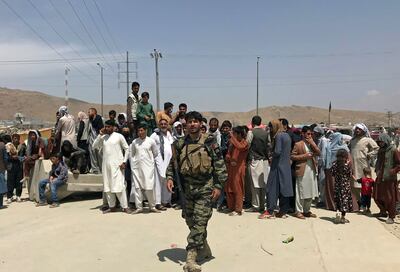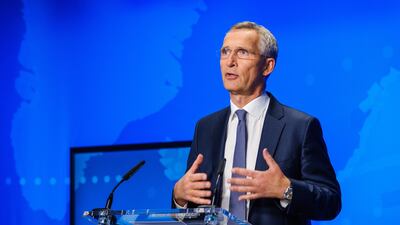As questions mounted about Nato’s future after the collapse of a 20-year mission in Afghanistan, the head of the alliance said soul-searching would have to wait until staff were rescued from Kabul.
Jens Stoltenberg said 800 Nato personnel were manning the airport where the US and its allies were scrambling to pull people out for a second day on Tuesday.
He confirmed that Nato had suspended all co-operation with Kabul after the Taliban seized power.
Echoing US President Joe Biden, Mr Stoltenberg pointed the finger at the ousted Afghan government for failing to resist the Taliban.
“Despite our considerable investment and sacrifice over two decades, the collapse was swift and sudden,” he said.
“The Afghan political leadership failed to stand up to the Taliban and to achieve the peaceful solution that Afghans desperately wanted. This failure of the Afghan leadership led to the tragedy we are witnessing today.”
Nato’s troop presence peaked in 2011 with more than 130,000 foreign troops, before numbers were reduced as the focus shifted to training Afghans.
Mr Stoltenberg defended the full withdrawal that followed Mr Biden’s decision to pull out all US troops by September.
But there was concern in Europe over the impact of a decision by Washington which its allies had little choice but to comply with.
EU leaders are preparing for a surge of Afghan migrants to the continent after hundreds of thousands of people were displaced by fighting.
Nato's 'biggest debacle'
“[The] EU is again a passive bystander while it will be essentially Europe that will deal with the fallout,” said Guy Verhofstadt, a senior member of the European Parliament.
Armin Laschet, a candidate to be the next leader of Germany, described the fall of Kabul as the “biggest debacle that Nato has suffered since its foundation”.
“After this rescue mission, we need a blunt analysis of our failures, in Germany, with our allies and in the international community,” he said. “We are standing on the brink of a new epoch.
“The US decision to pull out of Afghanistan very quickly had immediate consequences for German and European politics and for the German army.”

Gavin Barwell, a former chief of staff in the UK government, said the US was likely to offer less support in future in places such as Afghanistan that did not directly engage American interests.
Europe had a more vital interest in Afghanistan's stability because of the likely refugee flow to its borders, he said.
"Europeans are going to have to develop the capability to intervene without US support," Mr Barwell said. "That's not going to be cheap."
Calls for Europe to develop its own “strategic autonomy” became louder during the strained relations of the Donald Trump years.
Mr Trump frequently clashed with Nato leaders and openly discussed breaking the alliance’s mutual defence guarantee.
Mr Biden’s election appeared to herald an improvement in transatlantic relations, but the Afghan crisis has raised new questions.
“Afghanistan is also a failure of Nato and the European Union,” said Giovanna de Maio, a Europe expert at the Brookings Institution think tank.
“If Europeans were serious about strategic autonomy they should have shown it there.”
Mr Stoltenberg said Nato’s immediate focus was on completing the removal of US and European personnel and of Afghan civilians who helped them.
He defended the withdrawal by saying that Nato forces had never intended to stay in Afghanistan forever and that the 20-year mission had prevented terrorist attacks from Afghanistan.
But he acknowledged that an “honest, clear-eyed assessment of Nato’s own engagement in Afghanistan” was needed after the fall of Kabul.
“There are lessons that need to be learned from Afghanistan, and we will do that,” he said. “But the main focus today is to get people out.”


